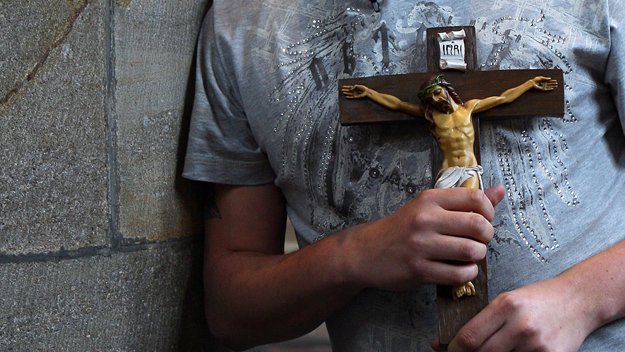
Have you listened to children praying recently? We can learn a lot. Here are a few heard recently:
“Lord, Is Pastor Dan a friend of yours or do you just know him through the business?”
“Dear God, is it true my father won’t get in Heaven if he uses his golf words in the house?”
“Dear God, my Grandpa says you were around when he was a little boy. How far back do you go?
“Dear God, in Bible times, did they really talk that fancy?”
“God, maybe Cain and Abel would not kill each other so much if they each had their own rooms. It works out OK with me and my brother.”
“God, I went to this wedding and they were kissing right there in the church. Is that OK?”
“Dear God, please send me a pony. I never asked for anything before. You can look it up.”
“Dear God, are you really invisible or is that just a trick?”
“God, I want to be just like my daddy when I grow up but not so hairy.”
“Dear Lord, do you draw the lines around the countries? If you don’t , who does?”
“Dear Lord, I don’t think anybody could be a better God, and I am not just saying that because You are God already.”
As God’s children, we can come freely and boldly to His eternal throne and share with Him whatever is on our hearts, our hopes, our fears, needs and our questions. Seven times in this chapter James mentions prayer. He encourages us to:
Prayer for the Suffering (James 5:13)
Prayer for the Sick (James 5:14)
Prayer for the Straying (James 5:19-20)

 Sometimes patience is a virtue absent in the holiest of saints. On the last day of the Papal visit to the UK in 2010, there was a little known incident on his way back to Heathrow. The Pope was delayed due to meetings and was going to miss his flight. When the limousine arrived, the driver was overjoyed to be carrying the Pope. But he was nervous and drove very slowly. The Pope asked him to speed up. But the driver went slower; he wanted to keep the Pope in his limousine as long as he could. The Pope insisted on driving the limo himself. The Pope sped off and was clocked by a speed camera doing 85 mph.
Sometimes patience is a virtue absent in the holiest of saints. On the last day of the Papal visit to the UK in 2010, there was a little known incident on his way back to Heathrow. The Pope was delayed due to meetings and was going to miss his flight. When the limousine arrived, the driver was overjoyed to be carrying the Pope. But he was nervous and drove very slowly. The Pope asked him to speed up. But the driver went slower; he wanted to keep the Pope in his limousine as long as he could. The Pope insisted on driving the limo himself. The Pope sped off and was clocked by a speed camera doing 85 mph. How can you be sure that you are a Christian? How can you know that you know? This is one of the most important questions you can ever answer in life. It is foundational to your life and growth as a Christ follower. Without the peace of mind that God loves you and that you are a child of God, you will never feel secure. You will always be tempted to doubt your faith. You will fear that you are not good enough. You will worry that you might lose your faith. Tonight I want us to answer the question once and for all. Please turn with me to 1 John 5. In verse 13 John writes,
How can you be sure that you are a Christian? How can you know that you know? This is one of the most important questions you can ever answer in life. It is foundational to your life and growth as a Christ follower. Without the peace of mind that God loves you and that you are a child of God, you will never feel secure. You will always be tempted to doubt your faith. You will fear that you are not good enough. You will worry that you might lose your faith. Tonight I want us to answer the question once and for all. Please turn with me to 1 John 5. In verse 13 John writes, This year we are celebrating the 175th Anniversary of Christ Church. Virginia Water has changed a great deal since the early 19th Century. The 1830’s were troubled years in Britain. Agricultural depression, large scale unemployment, poverty and rioting in rural areas. In 1846, the Cambridge Chronicle described Virginia Water as inhabited chiefly by “agricultural labourers, and not a few idle poachers,… in a state of ignorance, ungodliness and spiritual destitution rarely equalled.” The nearest church was St John’s in Egham and there were few free places allocated to the poor.
This year we are celebrating the 175th Anniversary of Christ Church. Virginia Water has changed a great deal since the early 19th Century. The 1830’s were troubled years in Britain. Agricultural depression, large scale unemployment, poverty and rioting in rural areas. In 1846, the Cambridge Chronicle described Virginia Water as inhabited chiefly by “agricultural labourers, and not a few idle poachers,… in a state of ignorance, ungodliness and spiritual destitution rarely equalled.” The nearest church was St John’s in Egham and there were few free places allocated to the poor.
 “A little boy is on the beach. On his knees he scoops the sand with his plastic shovel into a bright red bucket. Then he upends the bucket on the surface and lifts it. And, to the delight of the little architect, a castle tower is created.
“A little boy is on the beach. On his knees he scoops the sand with his plastic shovel into a bright red bucket. Then he upends the bucket on the surface and lifts it. And, to the delight of the little architect, a castle tower is created.